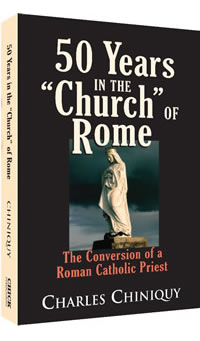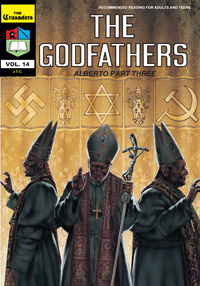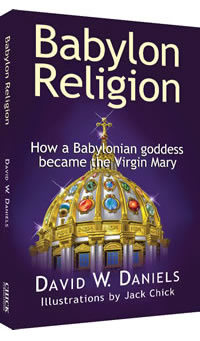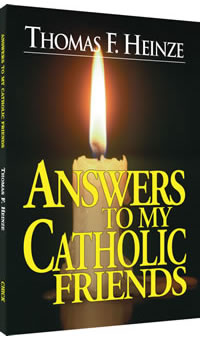Purgatory: Gold Mine of the Priesthood
- Issue Date: November/December 1997
Much confusion exists among Protestants regarding the Roman Catholic teaching of purgatory, largely because Rome is careful not to discuss it too openly where a Protestant might hear.
Yet among Catholic people, the doctrine is a central item in the religion of fear that makes them slaves to their priests and pope.
As with other teachings of a mystery religion, teachings on purgatory are somewhat confusing. First, Catholics are taught that there are two kinds of sins: mortal and venial. The mortal sins can send them to hell, and the venial sins are easily forgiven. Then, they are told that mortal sin can have two kinds of punishment: eternal (in hell) and temporal (in purgatory).
Even if the priest forgives all mortal sins in confession, and death follows quickly before the Catholic can sin any more, unless the Catholic has performed enough good works and given enough money to his church, he must still go to purgatory for "temporal" punishment. For the Catholic, Christ's sacrifice was not enough.
If you are confused that is normal. The effect is to keep Catholics from ever knowing for sure when they or their loved ones will be free from purgatory, thus insuring the continued flow of cash to the priest to say more masses to release loved ones from the flames!
"The doctrine of purgatory rests on the assumption that while God forgives sin, His justice nevertheless demands that the sinner must suffer the full punishment due to him for his sin before he will be allowed to enter heaven." (Boettner, Roman Catholicism, P. 219)
The belief in a place of purification by fire before entering heaven did not begin with Roman Catholicism. It has its roots far back in the ancient mystery religions that gave rise to the Catholicism of today. The Egyptians, Greeks, Romans and others believed it.
As Boettner points out in his classic, Roman Catholicism, "In the writings of Augustine (died, 430 A.D.) the doctrine of purgatory was first given definite form...
"It was, however, not until the sixth century that it received formal shape at the hands of Gregory the Great, who held the papal office from 590 to 604 A.D. The invisible world was divided into heaven, hell, and purgatory, with the imagination attempting to portray as vividly as possible the topography and experiences of each region. The doctrine was proclaimed an article of faith in 1438, by the Council of Florence, and was later confirmed by the Council of Trent, in 1548. But does any intelligent person believe that if such a place as purgatory is described in the Bible that it would have taken the church fathers 600 years to discover it, and another 1000 years to confirm it?"
Roman Theologians teach that the pain of purgatory is greater than any suffering possible in this human body, sometimes lasting for centuries. Interestingly, the pope is believed to have special authority over purgatory, so that he can grant special "indulgences" which are supposed to get people out of purgatory sooner if they perform certain acts or give certain gifts to the Roman church.
However, once he dies, the poor pope is just a helpless victim of the flames like anyone else, dependent upon the prayers and sacrifices of the living to shorten his suffering. What a system!
Roman Catholics must live in constant fear of death. They cannot know the sweet peace with which a Christian faces death, for they see death as a doorway to the flames, no matter how good a Catholic they have been.
More and more cash is extorted from bereaved family members who must pay to have more prayers and masses said, they cannot sleep thinking of the torment of their loved ones.
Even then, the priest cannot ever say when it is enough! The cry is always for just a few more masses. No wonder purgatory has been called the "gold mine of the priesthood!"
How sweet were the words of Jesus as he looked at the repentant thief on the adjacent cross and said, "Today shalt thou be with me in Paradise" (Luke 23:43).
Nearly one billion precious people have been fed the lie, that there is no sure way to escape the flames of God's wrath. Will you tell them the truth?
- See more articles on related topics:
- Catholicism
- Catholic Doctrine vs Scripture
Other Articles from November/December 1997:
- 'Alberto's Death Won't Stop Us From Winning Catholics to Christ'
- Buddhist Fad Makes for New Witnessing Opportunity
- Eavesdropping Can Bring Witnessing Opportunities
- Chick Mail Bag
- A Message From Jack Chick
- Chick's Nigerian Distributor Jailed for 5 Weeks Over Chick Tract
- Orthodox Church Persuades Russia to Outlaw Bible Believing Churches
- Witness in Malls
The 'Small Table' Strategy
- Witness in Parks
: Don't Get Arrested: Just Learn the Rules
More on Catholicism:
Products of Interest:
-

50 Years in the Church of Rome
368 pages
This classic work shows how this priest began to question Catholic teachings until he became saved, and led his entire parish to salvation. -

Alberto
32-PAGE, FULL COLOR COMIC BOOK - Alberto Series Part 1 - Here is how Alberto, as a Jesuit, helped destroy churches and ministries. But as he read the Scriptures, he saw that Catholicism couldn’t save.
-

Godfathers, The
32-PAGE, FULL COLOR COMIC BOOK- Alberto Series Part 3 - Here’s how the Roman Catholic Institution, as the "Mother of Abominations" (Rev. 17), caused many wars. This is the book the Catholic press is afraid to mention.
-

Babylon Religion
224 pages
Learn how a Babylonian goddess became the Virgin Mary. An easy-to-read history of Catholicism's Babylonian origin. -

Answers To My Catholic Friends
64 pages
A gentle witness you can give Catholics that deals with venerating images, purgatory, where popes go when they die, and more.



